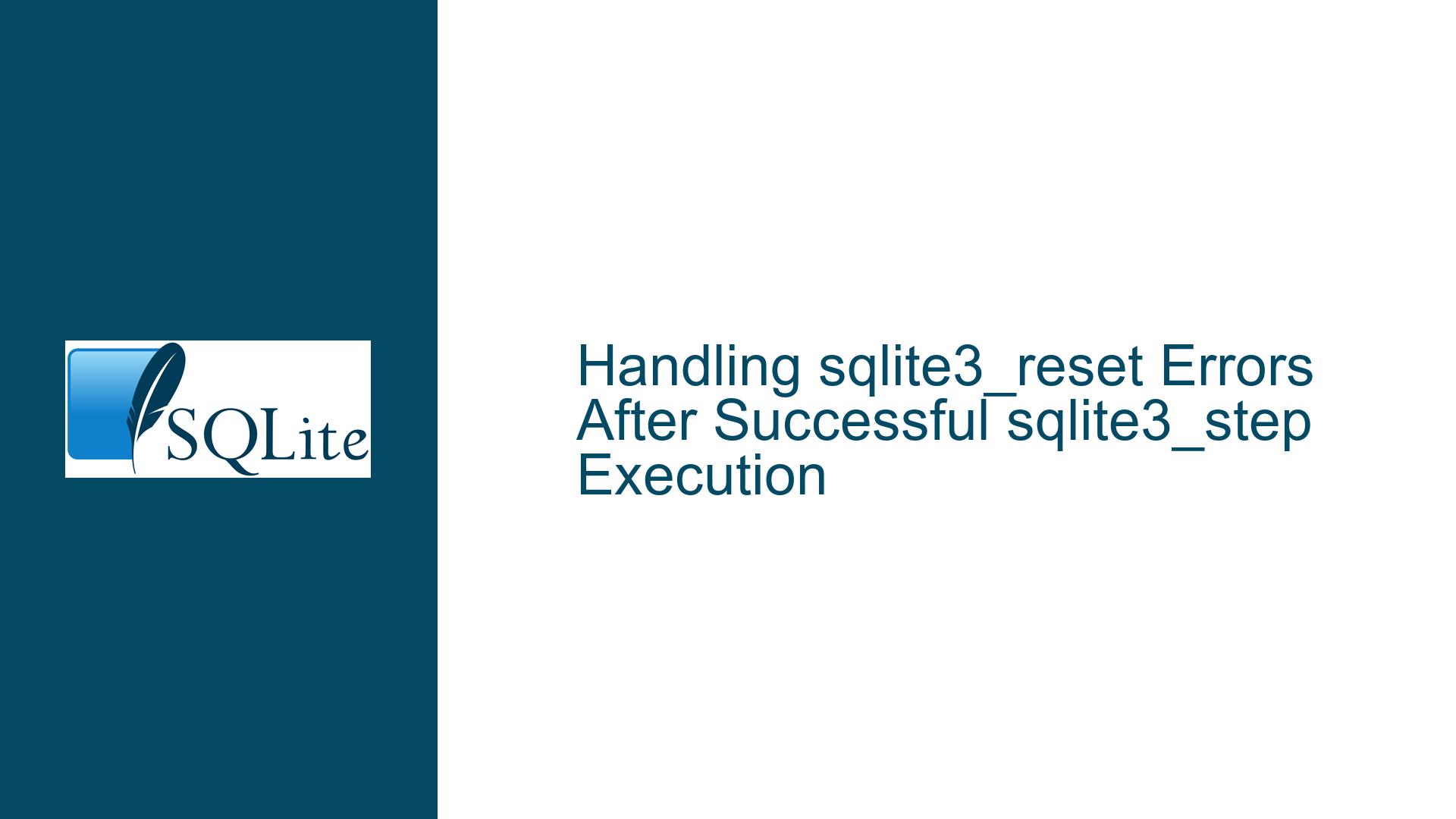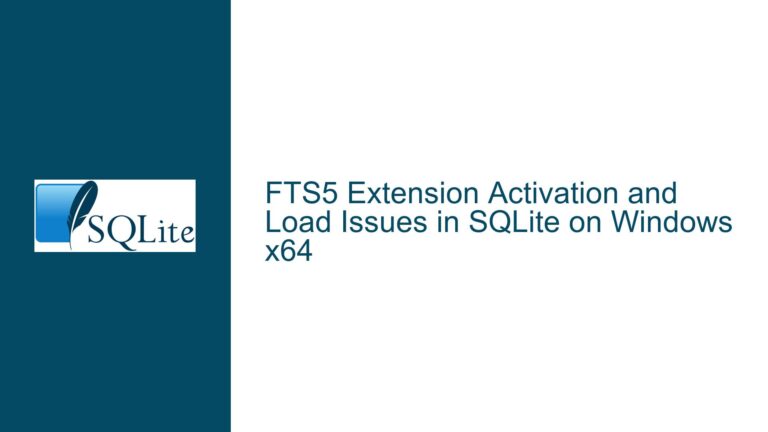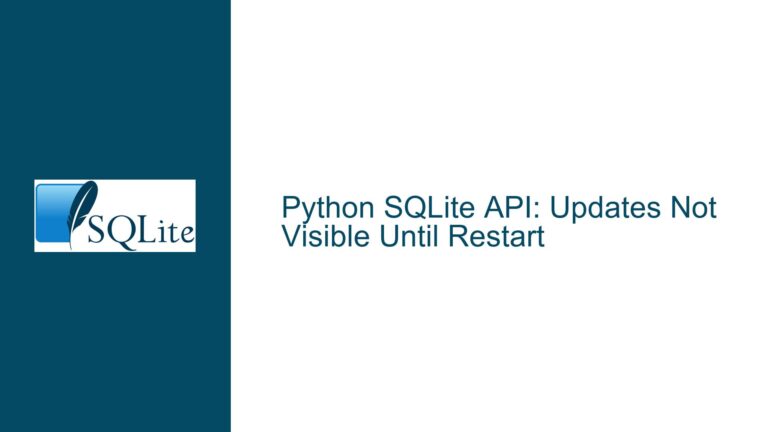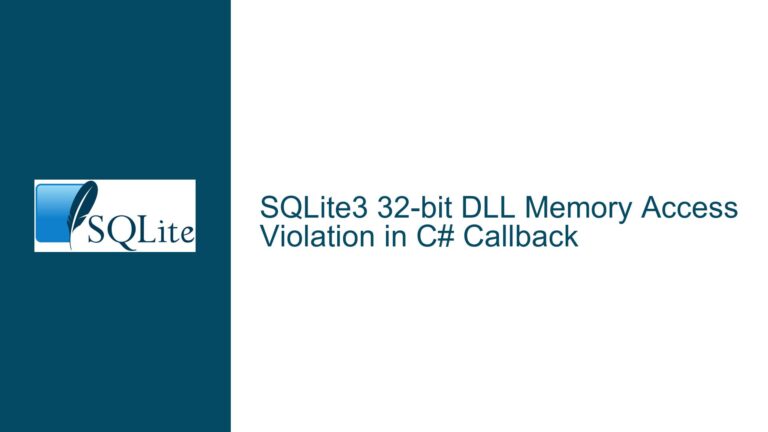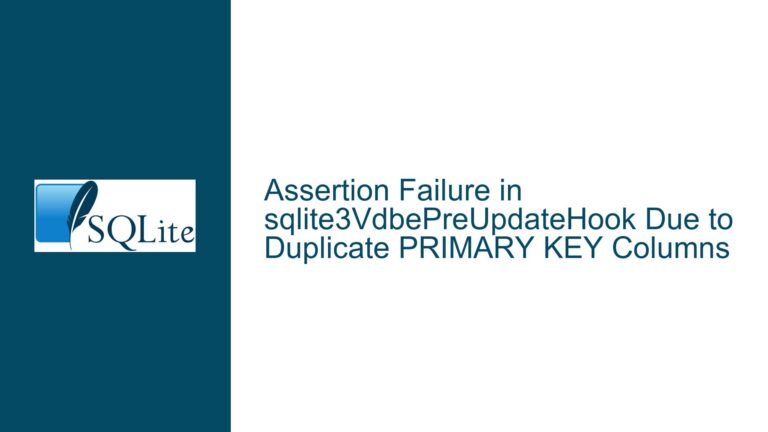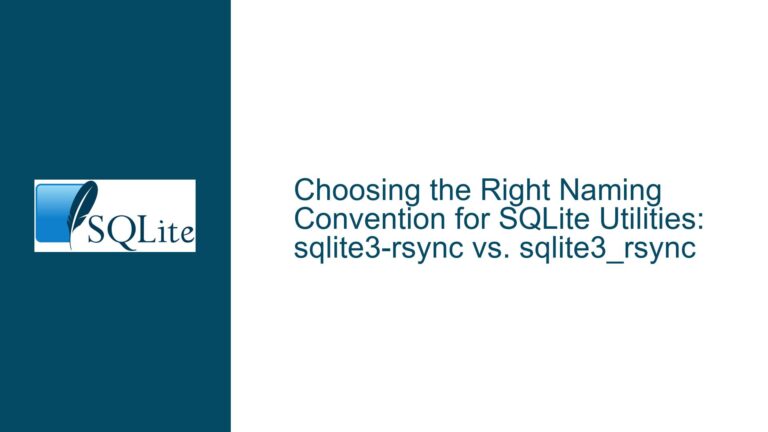Handling sqlite3_reset Errors After Successful sqlite3_step Execution
Understanding Delayed Statement Reset Failures in SQLite
Scenario: Post-Step Statement Reset Returns Error Despite Prior Success
The core issue revolves around scenarios where a call to sqlite3_step() on a prepared statement returns SQLITE_ROW or SQLITE_DONE (indicating partial or full success), but a subsequent call to sqlite3_reset() fails with an error code such as SQLITE_BUSY, SQLITE_NOMEM, or others. This behavior is critical for developers building abstractions like RAII wrappers, where automatic resource cleanup (e.g., resetting prepared statements) must account for deferred errors that manifest only during cleanup phases.
The challenge lies in reconciling SQLite’s documentation, which historically warned about reset errors even after successful steps, with modern implementations where certain edge cases (e.g., RETURNING clause behavior) have been altered. For example, prior to version 3.38.0 (2022-02-22), an INSERT ... RETURNING statement might emit SQLITE_ROW during sqlite3_step() but leave transactional changes incomplete, leading to potential errors during sqlite3_reset(). Post-3.38.0, such mutations complete before emitting rows, reducing the likelihood of reset errors from transactional conflicts. However, other error pathways, such as memory allocation failures, remain relevant.
Key Factors Enabling Post-Step Reset Failures
1. Transactional Semantics and Statement Finalization
SQLite operates with implicit and explicit transactions. A prepared statement is considered "active" until sqlite3_reset() or sqlite3_finalize() is called. When sqlite3_step() returns SQLITE_DONE or an error, SQLite automatically calls sqlite3_reset() internally under specific conditions (post-3.6.23.1). However, this automatic reset occurs during the next call to sqlite3_step(), not immediately. Thus, a statement remains active until explicitly reset or reused. If an error occurs during the implicit reset (triggered by a subsequent sqlite3_step()), it surfaces at that point, complicating error handling in wrappers that assume prior success.
2. Resource Contention and Asynchronous Errors
Errors like SQLITE_BUSY (database locked) or SQLITE_NOMEM (out of memory) may not manifest during sqlite3_step() but arise during sqlite3_reset(). For instance, if a query retrieves a text column via sqlite3_column_text16(), memory allocation for the UTF-16 conversion occurs lazily. If an out-of-memory condition is simulated during this conversion (e.g., via custom allocator hooks), sqlite3_reset() will fail with SQLITE_NOMEM even though sqlite3_step() succeeded.
3. API Contract Ambiguities
The documentation states that sqlite3_reset() may return errors if "resetting the prepared statement caused a new error." This implies that certain operations deferred to the reset phase (e.g., finalizing deferred updates, releasing locks, or cleaning up transient resources) can fail independently of the step phase. RAII wrappers must distinguish between errors arising from the user’s query logic (handled during sqlite3_step()) and those from internal cleanup (handled during sqlite3_reset()).
Diagnosing and Mitigating Post-Step Reset Errors
Step 1: Reproducing the Error Condition
To validate an RAII wrapper’s handling of post-step reset errors, craft a test case that forces sqlite3_reset() to fail after a successful sqlite3_step(). A reliable method involves inducing an out-of-memory error during string conversion:
// Pseudocode for inducing SQLITE_NOMEM on reset
sqlite3_open(":memory:", &db);
sqlite3_prepare_v2(db, "SELECT 'test';", -1, &stmt, NULL);
// Execute step (successfully returns SQLITE_ROW)
int rc_step = sqlite3_step(stmt);
assert(rc_step == SQLITE_ROW);
// Force OOM during column text extraction
enable_custom_allocator(FAIL_NEXT_ALLOC);
const void* text = sqlite3_column_text16(stmt, 0); // Triggers OOM
// Attempt reset - should return SQLITE_NOMEM
int rc_reset = sqlite3_reset(stmt);
assert(rc_reset == SQLITE_NOMEM);
// Cleanup
disable_custom_allocator();
sqlite3_finalize(stmt);
sqlite3_close(db);
This test confirms that the wrapper correctly handles reset failures even when steps succeed. Note that the error arises not from the query execution itself but from ancillary operations deferred to the reset phase.
Step 2: Version-Specific Behavior Analysis
To determine whether historical scenarios (e.g., RETURNING clause conflicts) still apply, test against SQLite versions:
- Pre-3.38.0: An
INSERT ... RETURNINGstatement might returnSQLITE_ROWbut leave transactional changes uncommitted until reset. Concurrent writes in a busy database could causeSQLITE_BUSYduring reset. - Post-3.38.0: All mutations complete before emitting
SQLITE_ROW, makingSQLITE_BUSYduring reset unlikely forRETURNINGqueries. However, other operations (e.g.,VACUUM) may still exhibit this behavior.
Step 3: Implicit Reset Timing and Transaction Control
Clarify when automatic resets occur:
- If
sqlite3_step()returns anything exceptSQLITE_ROW, the statement is automatically reset on the next call tosqlite3_step(), not immediately. Thus, transactional boundaries (e.g., commits) may remain open until the next step or explicit reset. For example:// Step 1: Start implicit transaction via INSERT sqlite3_step(stmt); // Returns SQLITE_DONE // Implicit transaction remains open until reset! sqlite3_reset(stmt); // Explicit reset commits transactionRAII wrappers must ensure that statements are reset promptly to avoid lingering transactions, which can cause deadlocks or data inconsistency.
Step 4: Error Propagation in Wrappers
Design the wrapper to capture reset errors and defer them to subsequent operations:
- After a successful
sqlite3_step(), store anysqlite3_reset()error code internally. - On the next attempt to use the statement, check for a pending reset error and surface it before proceeding.
- Example flow:
class StatementWrapper { sqlite3_stmt* stmt; int reset_error = SQLITE_OK; public: ~StatementWrapper() { sqlite3_finalize(stmt); } bool step() { if (reset_error != SQLITE_OK) { throw Error(reset_error); // Propagate deferred reset error } int rc = sqlite3_step(stmt); if (rc != SQLITE_ROW && rc != SQLITE_DONE) { throw Error(rc); } return (rc == SQLITE_ROW); } void reset() { reset_error = sqlite3_reset(stmt); if (reset_error != SQLITE_OK) { // Optionally log, but defer throwing until next step } } };
Step 5: Observability of Reset Errors
Determine whether end-users should be notified of reset errors:
- Read-only queries: A reset error (e.g.,
SQLITE_NOMEM) after data retrieval is unlikely to affect already-fetched results. The wrapper may suppress such errors unless subsequent reuse is attempted. - Mutation queries: If a reset error indicates incomplete cleanup (e.g., a deferred constraint check), the wrapper must treat it as a potential data integrity issue. For example, a
SQLITE_BUSYduring reset might imply that a transaction was rolled back, requiring re-execution.
By methodically addressing these factors, developers can construct robust SQLite wrappers that handle the nuances of deferred reset errors, ensuring transactional integrity and proper resource management across all SQLite versions.
